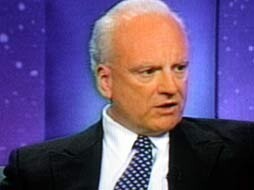The Electronic Intifada 29 March 2004

Against All Enemies by Richard A. Clarke
Undoubtedly, Clarke’s book is quite important, as is his recent testimony to the commission investigating the September 11 attacks. And his analysis on the Bush administration’s true (albeit private) rationale for war is both valuable and insightful: he writes that Bush’s senior advisers (Vice President Dick Cheney, Secretary of Defense Donald Rumsfeld, and Deputy Secretary of Defense Paul Wolfowitz) wanted to finish what they started with the Gulf War; improve Israel’s strategic position by eliminating Saddam Hussein’s military; create a U.S.-friendly Arab democracy to serve as a prototype for other Arab states like Egypt and Saudi Arabia; permit the withdrawal of U.S. forces stationed in Saudi Arabia to counter any Iraqi threat; and “create another friendly source of oil for the U.S. market and reduce dependency upon oil from Saudi Arabia, which might suffer overthrow someday.”
Clarke is by no means ignorant of how the Israeli-Palestinian conflict fuels the popularity of groups like al Qaeda. He writes how the Palestinian problem serves as a litmus test for “so many Muslims,” and that the Bush administration has failed to properly address this most dire of conflicts. And Clarke was aware that if Israel had sent airborne forces into Iraq following Iraq’s missile attack on Israel during the Gulf War, “the U.S.-Arab coalition might rupture before the ground war had even begun.”
But Clarke also mentions that while under the Reagan administration he “sought to find roles for the Israeli military in joint operations with American forces in the event of a war with the Soviet Union” and how he was part of the construction of a “Strategic Cooperation” with Israel, which Clarke describes as “just short of a military alliance.”
In the few pages of his book that Clarke discusses Israel, he writes how he influenced Israel to cut off ties with Apartheid South Africa. And he adds, “Our stronger military relationship with Israel came about only by the Reagan White House imposing it on the Pentagon and State Department. The decision was the right thing to do militarily and morally, but the closer relationship with Tel Aviv did over time inflame some Arab radicals and give them propaganda to help recruit terrorists to their anti-American cause.”
Of course, Clarke fails to mention how Israel had been (and still is) occupying and colonizing Palestinian land, treating its own Arab citizens as third-class citizens, and refuses to allow the return of the Palestinians that were forced out by Israel during the 1948 and 1967 wars. And nowhere is it discussed that U.S. taxpayers have been forking over billions of dollars to Israel while it is continually violating international law and threatening the stability of the Middle East. But these omissions should come as no surprise considering that Clarke was once disciplined for “his lack of oversight on Israel” while Israel was illegally transferring American technology to China during the Reagan era, as was reported by Michael Saba in Arab News.
Clarke writes in his book, “After the [Gulf War], CIA circulated unfounded rumors that Israel had sold some of the Patriots to China. Many in the State Department who thought that I was ‘too close to the Israelis’ sought to blame me.” However, these were more than rumors. As Arab News explains, in 1992, State Department Inspector General Sherman Funk drew a report criticizing the State Department Bureau of Political-Military Affairs (Clarke was then Assistant Secretary of State for Political-Military Affairs) “for ignoring scores of intelligence reports on apparent violations of retransfer restrictions and other restrictions and for not reporting them to senior officials and Congress, as required by law.”

Richard Clarke (EI Screenshot)
So what does it mean when Clarke writes, “If we could achieve a Middle East peace much of the popular support for al Qaeda and much of the hatred for America would evaporate overnight”? Clearly Clarke is aware that anger towards U.S. foreign policy in the Middle East is a huge factor in recruiting volunteers for terrorist attacks directed at American targets, and that the American funding of Israel while it is pushing out the Palestinians is the most offensive policy of all. After reading Clarke’s lucid (although sometimes too dramatically embellished) history of the Reagan, George H. W. Bush, Clinton, and current Bush administrations’ treatment of terrorism threats, one knows that Clarke is no dummy. So why is this important piece missing from the puzzle?
Discussing the relationship between the U.S. and Israeli militaries, and how the U.S. military is using Israeli tactics while occupying Iraq, former CIA analyst Kathleen Christison writes on CounterPunch, “almost all influential individuals and groups in the U.S. political landscape still shy away from discussing the degree to which this Israeli connection has been a major factor in determining the entire complex of U.S. policies on Iraq and the Middle East since September 11. In the eyes of most Americans, the correctness of the ever stronger ties between the right-wing governments of the United States and Israel is simply not to be questioned.”
Christison notes how she and her husband Bill, who also worked for the CIA, were interviewed for the documentary Uncovered: The Whole Truth About the Iraq War, which features testimonies from U.S. intelligence community insiders, many of whom are also quoted in Clarke’s book. However, only Kathleen Christison appears in the documentary, and for only a few seconds. Their hour-long interview, during which they discussed the Israel connection, ended up on the cutting room floor, apparently because the issue is too taboo to be mentioned in the film.
Richard A. Clarke knows that the Israeli-Palestinian conflict needs to be resolved, otherwise al-Qaeda will continue to seem more and more legitimate to those who would otherwise not be attracted to the warped, puritanical perversion of Islam that al Qaeda is pushing. And he writes how the Bush administration has squandered any opportunity to alleviate the conflict. But Clarke fails to acknowledge that the institutional support of Israel by the U.S., which rose to its current pitch under the Reagan administration and continues unchecked to this day, is the problem.
Because of Clarke’s keen insight on the Bush administration’s motivations behind its illegitimate war on Iraq, and his right-on-target critique of how the current U.S. administration completely failed to take advantage of post-September 11 world sympathy towards the U.S. by strengthening international relations and decisively dismantling al Qaeda’s network, one tends to think that Clarke knows how problematic the U.S.’ relationship with Israel is when considering the popularity and success of al Qaeda.
Perhaps his failure to explain this factor in his book is testament to how taboo the subject of the U.S.’ unpractical and unethical alliance with Israel is in the country— a person like Clarke can write an exposé on the utter failure of the Bush administration to address threats against the people its supposed to serve, but he can’t discuss the Israel connection, lest he be totally marginalized for bringing the subject up. But Clarke fails the American public as well when he ignores the U.S.-Israel alliance and how it effectively feeds the popularity of al Qaeda, which has been able to capitalize on this touchstone of identity in the Middle East.
Related Links
Maureen Clare Murphy writes frequently for both The Electronic Intifada and its sister site Electronic Iraq




